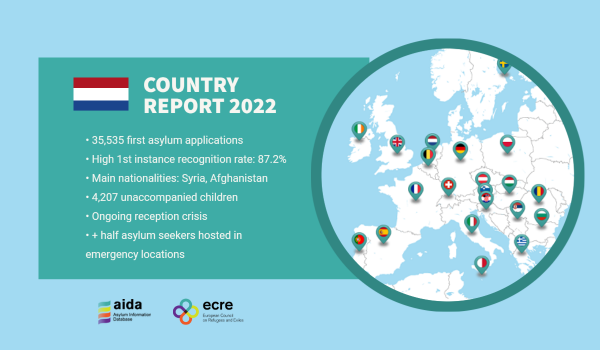The updated AIDA Country Report on the Netherlands provides a detailed overview on legislative and practice-related developments in asylum procedures, reception conditions, detention of asylum seekers and content of international protection in 2022. Further, the report includes an annex providing an overview of temporary protection.
In 2022, a total of 35,535 first applications for international protection were lodged in the Netherlands, mainly by Syrian (12,648), Afghan (2,732) and Turkish (2,648) nationals. This is a considerable increase compared to 2021, when the number of first applications was 24,725. The overall recognition rate at first instance stood – unprecedented in recent years – at 87.2%, reaching 99% for Afghans, 96.6% for Syrians, and 99.2% for Yemenites.
Due to the high number of asylum applications and capacity problems at the IND, a pre-registration procedure was introduced since September 2022. “Pre-registered” asylum seekers were hosted in temporary shelters, where they had to wait for a period up to four months before receiving an invitation for their official registration. From the end of 2022, the backlog of registrations was reduced and registrations at Ter Apel could re-start. Due to the existing backlog, IND also extended by nine months the time to issue an asylum decision for applications lodged after 27 September, a similar decision on extension of the procedure was published in February 2023, establishing that the time limit to issue a decision on asylum applications lodged between 1 January 2023 and 1 January 2024 will also be of 15 months for national authorities.
The reception crisis that the country registered from 2021 continued throughout 2022. Between May and September, newly arrived asylum seekers, waiting to register their application in Ter Apel have been sleeping on chairs, on the floor or outdoors in front of the centre, for one or more days. At the beginning of September, the Ministry of Defence opened a location at Marnewaard to temporarily house unregistered asylum seekers during their registration period at Ter Apel. Throughout the year, almost half of those the persons entitled to reception conditions were hosted in a variety of temporary or crisis emergency locations, among which sport halls, tents, boats, cruise ships, old office buildings and hotels. Overall, the conditions in these locations were found to be extremely below standard, as recognised also in a judgement of the Court of the Hague; many did not ensure respect for privacy and security of the people hosted, and concerns emerged regarding access to health care and education for children. Unaccompanied minors were especially affected by the reception crisis; in particular, the national Ombudsperson for Children raised concerns multiple times regarding the situation they were facing in Ter Apel.
The Cabinet on family reunification introduced a waiting period before family members of protection beneficiaries could obtain their visa at a consular service after receiving a positive decision had been given by the IND. Several regional courts ruled that such a measure was unlawful, which was confirmed in a ruling from the Council of State in February 2023.
For further information:
- Find comparative information in the Asylum Information Database (AIDA)managed by ECRE

